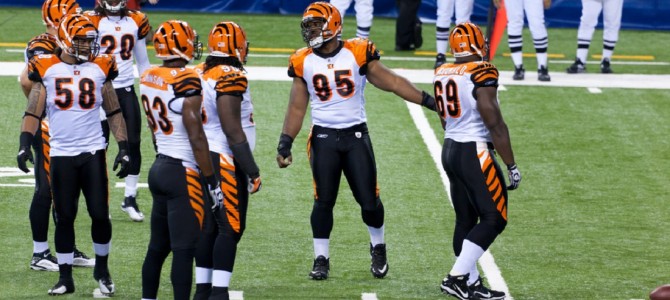If you’ve ever struggled to find the right metaphor for a society ruled by unbridled regulators, you could do worse than Saturday night’s Bengals-Steelers playoff game.
With less than 30 seconds remaining, Pittsburgh, down 16-15, watched as a Bengals linebacker took a cheap shot on star receiver Antonio Brown. The 15-yard personal foul penalty put them in line for a 50-yard field goal, no sure thing given cold temperatures and a green placekicker. But the Steelers received a gift from the football gods in the form of a petulant, power-mad referee.
A Pittsburgh coach confronted the Bengals defense. Cincinnati cornerback Adam “Pacman” Jones attempted to chase him off and made incidental contact with a referee. The ref immediately tossed a flag for an additional personal foul, turning a Hail Mary kick into a chip shot.
To sum up: a playoff game with major implications for fans, players, and coaches—there are already calls to fire the Bengals’ Marvin Lewis, who became the losing-est playoff coach in history following the field goal—was determined in the same fashion as a night club shoot-out prompted by a scuffed pair of Air Jordans. The referee felt he had been disrespected; so a team’s entire season must be annihilated.
It had all the makings of a government ruled by faceless federal agencies and nameless bureaucrats, rather than autonomous citizens competing in free markets and fair elections. The anonymous referee—whose name is left out of every press report I’ve seen—picked a winner and loser, rewarded a big-market team over a smaller competitor, and hurt consumers in the process.
Referees Become Players
This is not the first time a referee has played a deciding role in a game, nor will it be the last. The most memorable occurrence in recent years came in 2012 when an amateur replacement referee filling in for striking professionals ruled a Seahawks offensive pass interference a game-winning Seahawks touchdown as time expired.
The blown call led to popular outcry to bring back the regular National Football League refs, who had been locked out due to a labor dispute. The NFL caved. Refs returned emboldened. Fans mistook their return to the field as a return to objective expertise.
The replacement ref erred because he is human. Saturday’s ref erred because he thought himself a god. This is what happens when arbitrators forget their purpose. A referee is supposed to be a facilitator, rather than an actor in the action. Increasingly in football it’s been hard to tell the difference.
A penalty was called once every 17.4 plays in 2015, up from 20.3 plays in 2009, according to NFLPenalties.com. Refs threw 637 more flags this year than in 2009, an 18 percent gain. Much of that increase can be attributed to subjective calls. Refs called seven more pre-snap penalties—offsides, false start, etc.—in 2015 compared to 2009. They called 757 penalties that incurred automatic first down—pass interference, personal foul, etc.—157 more than they called in 2009, a nearly 30 percent increase.
Blame Rules that Expand the Bureaucracy
The increase is a direct result of the NFL’s broadening of pass interference rules and new personal foul measures barring hard hits, which went into effect in 2010. Of course, expanding the number of rules led to a growth of hubris among the people tasked with enforcement.
This is what we can expect from the federal government as the legislature delegates more and more of its rulemaking to federal agencies and their all-too-human experts. Federal agencies enact 3,000 rules each year. Congress voted on 318 bills in 2015 and passed just 115 laws. The more rules we have, the more the people on the sidelines will mistake themselves as the main actors in the daily drama of American life.
The day before the Steelers took the field in Cincinnati, Texas Gov. Greg Abbott called for a constitutional convention to debate nine amendments, most of which would be unnecessary if the Supreme Court ever bothered to uphold the original tenth. I don’t agree with the whole package—state review of the judiciary being the worst—but two stand out: No. 3, Prohibit administrative agencies from creating law; and No. 4, Prohibit administrative agencies from pre-empting state law.
The debate is more necessary than ever. Otherwise we’ll all be Pacman Jones soon enough.









